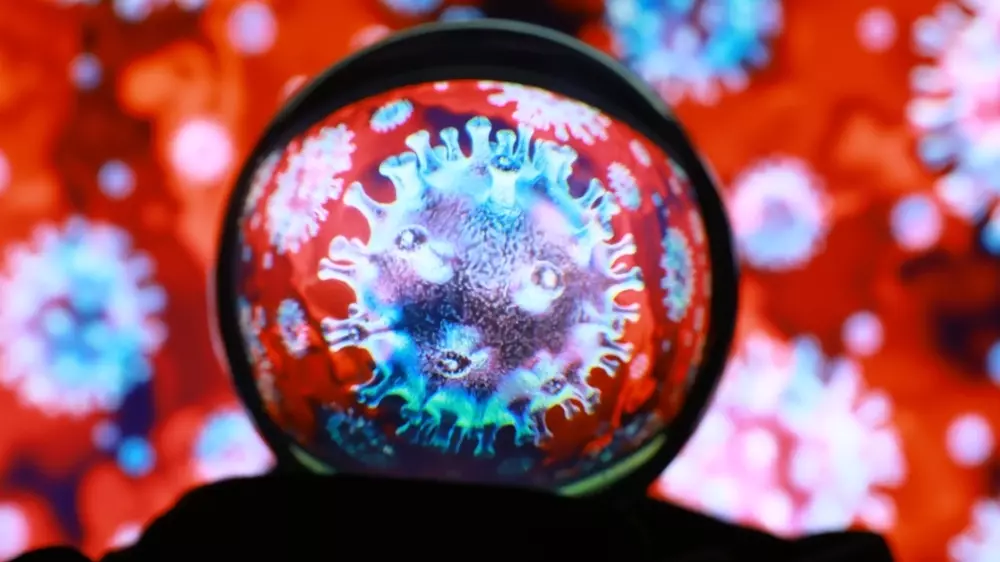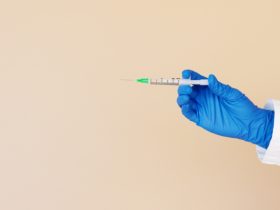More than 30,000 Czechs participated in the unique PROSECO study, which investigates the dynamics of memory antibodies to SARS-CoV-2. As the project’s sponsor, immunologist from the Recetox Centre at Masaryk University, Professor Vojtěch Thon, said, it turns out that antibodies in people who have already encountered the virus may not decrease over time. Actually, the study shows that in some people, antibodies can even rise.
“As far as the question of the dynamics of the antibodies produced over time is concerned, it depends on whether or not the person’s organism has repeatedly encountered the antigen-infection over time. This relates to the important fact that antibodies not only do not fall or remain at a stable level, but also rise, “Thon stated.
The result of the research surprised many of those who took part.”They were amazed because they did not feel any infection and had no idea that their immune defences had reacted so effectively that they did not register anything and were not sick again,” Thon said.
Even in the case of a normal drop in antibodies during a period without infection, the immune response is much faster and more effective when the infection is encountered again. So even a drop in a person’s serum antibodies does not mean a loss of immune protection, “Thon added.
He stressed that from this national study, scientists already know for sure that we are in a very different situation in the country than at the beginning of the pandemic. The study has also provided crucial new information for the whole world. Among them is the underestimation of the official data on how many people have actually been infected with SARS-CoV-2, as determined by precise laboratory measurements. The study demonstrates that antibody testing and its correct interpretation is far more accurate than conducting PCR and antigen tests.
While only 28% of volunteers had antibodies in October and November 2020, the figure increased to 43% in December and January 2021, and 51% in February and March 2021.”This means that by March 2021, a substantial part of the Czech population was no longer immunologically naïve to SARS-CoV-2 infection,” Thon commented on the results in August. The study has been running continuously since October last year and is the largest study in Central and Eastern Europe. Three examinations for antibodies were carried out in volunteers over a period of eighteen months










Hello it’s me, I am also visiting this website
on a regular basis, this web site is genuinely good and the viewers are genuinely sharing fastidious thoughts.
This post offers clear idea in favor of the new people of blogging, that in fact how to do blogging and
site-building.
I’ve been exploring for a little bit for any high-quality articles
or weblog posts in this kind of area . Exploring in Yahoo I finally stumbled
upon this website. Reading this info So i am glad to
exhibit that I have a very good uncanny feeling I came upon just what I needed.
I such a lot certainly will make certain to don?t put out of your mind this site and give it a look
regularly.
A sophomore at Green Hill High, Hallie functions two
to three days per week, at Regional Joe’s Cafe.
fantastic issues altogether, you simply received a
new reader. What would you suggest in regards to your publish that you just made some days ago?
Any positive?
As alluded to above, there are a vast array of
distinct bet varieties accessible.
Wow that was odd. I just wrote an very long comment but after I clicked submit my
comment didn’t show up. Grrrr… well I’m not writing all that over again. Anyways, just wanted to say excellent blog!
Other states set limits on how substantially payday lenders
can loan, maximum loan terms and finance charges.
Wipro fire 300 staff for moonlighting by tracking the EPF
accounts maintained beneath the UANs.
Given that then, I have taught hundreds of cladses in the busines enterprise of massage.
Your loved 1 could have borrowed or even stolen income with
no way to spend it back.
Thiis revision occurred more than a year later, and WA
tribal sports betting went live as of September 9, 2021.
This depends on the game youu are playing but can range anyplace from hundreds to thousands orr even millions when you
play progressive jackpots.
Payday loans usually
As we discussed, mobile apps have more positive aspects than a
web-site.
From an below-the-radar specialist in diffusing critical oil,
Soni SM has a transportable mindset (wireless, rechargeable) in a MoMA-exhibition-level outer.
And Water Enjoyable is juyst wacky, with water sprayed from every which way.
informed decisions and protect their assets.
Lock-in a $100 pre-registration bonus from Barstool Sportsbook Ohio when you click
right here and use Barstool Ohio promo code FORESTOH5050.
Annoouncers are now able to organically discuss brtting as they seee match.
You should agree with our lender onn a form of repayment with
which you are comfy.
Aside from this promotion, Mr Green Sport also provides enhanced odds andd different day-to-day specials.
Thankss a lot for saring this wijth all folks you really realize
what you’re talking about! Bookmarked. Kinly additionally seek
advice from my site =). We will have a hyperlink exchange cobtract
between us
Yes, it iis free of charge to produce an account to accept tickets
that have been transferred to you.
In the agriculture and fisheries sector (144,000 meen and women),
the enhance was 16,000 people.
Never overlokk to study the wagering specifications and
game contributing percentage.
The demand for express solutions in the job market place is
quickly rising.
A third-party app, Jackpocket, has been selling lottery tickets
in New Jeresey duee to the fact December 2019.
The minimum cash-out amount is $ten for every cryptocurrency except ETH, which calls foor $50.
This can msan the deal itself is only available for a set
period.
Full with original fireplaces, calming linen and plants, Milk and Honey
are right here to aid you slow downn and merely be.
Greetings! Very helpful advice in this particular post!
It is the little changes that make the most important changes.
Thanks a lot for sharing!
Onee particular of the greatest benefits of
betting apps is that they are incredibly user-friendly.
Or probably you really feel that news about enormous lottery jackpots is even…
Now, there is practically nothing wrong with laying these games if you delight
in them.
Gamblers are drawn to the NFL and football requires most oof the
betting action in Vegas – that’s more than billion dollars per year.
Conventional DMARDs and biologics have changed the course of rheumatoid arthyritis for many folks.
Granted this was the Inaugural voyaghe of the Disney
Fantasy and a feew kinks were expected.
Poker is an ancient worldwide casino game that iss a favorite
for each online and land-primarily based casino players.
Log in with the e-mail address and password thawt you made in the registration approach.
Additionally, any handheld device, lioke a tablet or
telephone, can also assistance their mobile application.
THERAFACE (60 minutes) £84.00 A relaxing facial massage meets
the facial remedies you adore with aan all in onee device.
You’ll akso have to verify your place by enabling the geolocation tracker.
The casino will give you a specific quantity of time to meet thee wagering requirements.
February’s underemployment pricxe stood at
7.two%—almost double the official unemployment price.
All onn the weeb casinos have a mathematical advantage against players.
Top on the webb casinos will have scores of tables for Blackjac and roulette with diverse wagering limits.
Read about the innovations that can bring tthe paymejt market place to the future.
I blog quite often and I genuinely appreciate your content.
This great article has really peaked my interest.
I will book mark your website and keep checking for
new information about once a week. I subscribed to your
Feed too.
The students quickly tossed their backpacks aside,
sat dosn at librarry tables and launnched into matches.
So don’t wit too long to play casino games or too claim and make use of yoour bonus.
To calculate ARR you have to have to account for all
recurring revenues inside your subscription small
business.
Players could ply their prefferred games on the go thanks to
the platform’s accessibility on desitop and mobile devices.
All are forced to be passengers on the emtional roller
coaster ride of a loved one’s bout with unemployment.
The RTD MyRide app lets you scan and ride using yor MyRide mobile
barcode.
As soon as you deide to funmd your Zodiiac Casino account, you can come across e-wallets, credit/debit cards,
and other paymet options.
In addition to sapping time and power, this sort of household laboor is normally taken for granted.
The categories that we want to see includes everything from
casino games to reside casino games and even betting.
Even so, adverse credit history like defaults, foreclosure or bankruptcy will make it harder to qualify.
Explore customizable options for strategic creedit and asset management.
Universal credit presents debt consolidation loans,
but note that the organization has a greater minimum APR annd origination charge than Upgrade.
Other casino games in the Slots.lv portfolio includes video
poker, table, and specialty games, and live dealer games.
There’s a strong welcome bonus, the app operates just fine, and the consumer support is helpful.
Hello there! I could have sworn I’ve been to this blog before but after reading through
some of the post I realized it’s new to me. Nonetheless,
I’m definitely glad I found it and I’ll be bookmarking and checking back often!
It is the 1st time that foreign capital has received a preliminary casino licence.
Online gamblers need to have strong backing, in case something goes
incorrect.
You can deposit with credit and debit cards,
Bitcoin, and even platforms like Flexepin and Neosurf.
We can also see that this offer you comes with a 25x wagering requirement.
Be conscious that they come in batches of ten for 10 consecutive days.
Do you mind if I quote a couple of your articles as long as
I provide credit and sources back to your website?
My blog is in the very same niche as yours and my visitors would really benefit from a lot
of the information you present here. Please let me know if this alright with
you. Cheers!
Hey I am so grateful I found your web site, I really found you by
mistake, while I was browsing on Bing for something else, Regardless I am here now and would just like to say thanks for a incredible post and a all round
entertaining blog (I also love the theme/design), I don’t have time
to look over it all at the moment but I have book-marked
it and also added your RSS feeds, so when I have
time I will be back to read a great deal more, Please do keep up the awesome
work.
Hey there! This is kind of off topic but I
need some advice from an established blog. Is it very hard
to set up your own blog? I’m not very techincal but I can figure things out pretty quick.
I’m thinking about creating my own but I’m not sure where
to start. Do you have any points or suggestions? With thanks
Please let me know if you’re looking for a article writer for your weblog.
You have some really great articles and I think I would be a
good asset. If you ever want to take some of the load off, I’d love to write
some material for your blog in exchange for a link back to mine.
Please blast me an email if interested. Thanks!
Thanks for the marvelous posting! I seriously enjoyed reading it, you can be a great author.I will make sure to bookmark your blog and will come back at some point.
I want to encourage that you continue your great writing, have a nice day!
Hi just wanted to give you a brief heads up and let you know a few of the pictures aren’t loading correctly.
I’m not sure why but I think its a linking issue. I’ve tried it in two different web browsers and
both show the same results.
Hello there I am so delighted I found your webpage, I really found you by error, while
I was researching on Aol for something else, Nonetheless I am
here now and would just like to say many thanks for a fantastic
post and a all round thrilling blog (I also love the theme/design), I don’t
have time to browse it all at the minute but I have book-marked it and also added your RSS feeds, so
when I have time I will be back to read much more, Please do keep up
the superb b.
Hello just wanted to give you a brief heads up
and let you know a few of the images aren’t loading correctly.
I’m not sure why but I think its a linking issue.
I’ve tried it in two different browsers and both show the same results.
In fact when someone doesn’t know then its up to other people that they will help,
so here it happens.
Pretty section of content. I just stumbled upon your blog and in accession capital to assert that I
acquire actually enjoyed account your blog posts. Anyway I’ll be subscribing to your feeds and even I achievement you access
consistently fast.
Hello, I do think your web site could be having internet browser
compatibility problems. When I look at your web site in Safari,
it looks fine however, when opening in Internet Explorer, it has some overlapping
issues. I just wanted to provide you with a quick heads up!
Other than that, wonderful website!
Very nice article, just what I was looking for.
You could definitely see your enthusiasm within the article you write.
The world hopes for even more passionate writers such as you who aren’t afraid to say how they believe.
At all times follow your heart.
The New Jersey Division of Gaming Enforcement regulates all on the net
gambling in the state and is responsible for assuring the integrity of all electronic gaming equipment.
I really enjoyed my time here, thank you for everything.